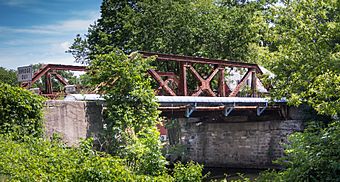US-12–Coldwater River Bridge facts for kids
Quick facts for kids |
|
|
US-12–Coldwater River Bridge
|
|
 |
|
| Location | Old US 12 over Coldwater Bridge, Coldwater, Michigan |
|---|---|
| Area | less than one acre |
| Built | 1920 |
| Built by | Brookville Bridge Company |
| Architect | Michigan State Highway Department |
| Architectural style | Pratt pony truss |
| Demolished | 2018 |
| MPS | Highway Bridges of Michigan MPS |
| NRHP reference No. | 99001609 |
| Added to NRHP | December 22, 1999 |
The US-12–Coldwater River Bridge was an old road bridge in Coldwater, Michigan. It used to carry a part of US-12 over the Coldwater River. This bridge was important enough to be added to the National Register of Historic Places in 1999. Sadly, it was taken down in 2018.
A Bridge's Story: How It Was Built and Used
The US-12–Coldwater River Bridge was built in 1920. The Brookville Bridge Company constructed it for the Michigan State Highway Department. It cost about $12,000 to build.
This bridge was part of a main road called US-112 back then. Today, that road is known as US-12. In 1933, the road was made straighter. This change removed a sharp turn at the end of the bridge.
The state then built a new bridge nearby. After that, the city of Coldwater became responsible for this older bridge.
Why the Bridge Was Taken Down
The bridge was closed to cars in the late 1990s. This was because it had a lot of rust and was becoming unsafe. People could still walk on it for a while.
However, on August 25, 2017, it was declared too dangerous. The bridge was then taken down in April 2018. There are plans to build a new bridge for people walking and biking in its place.
What the Bridge Looked Like
The US-12–Coldwater River Bridge was a special type of bridge. It was a five-panel steel Pratt pony truss bridge. This means it had a strong metal framework that looked like a series of triangles.
The main part of the bridge was 64 feet long. It was made from strong steel pieces. These pieces were riveted together to hold up the road. The road itself was made of concrete and was 21 feet wide.
One side of the bridge had a sidewalk. This sidewalk stuck out from the main bridge structure. It also had railings for safety. The bridge rested on strong foundations. These were made of natural fieldstones and concrete.



